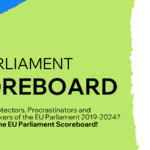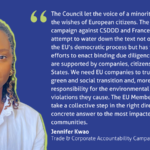The European Parliament voted today on the revision of the “Climate Action Regulation implementing the Paris Agreement” (Effort Sharing Regulation, or ESR), which covers emissions from transport, waste, buildings and agriculture for the coming decade.
The Parliament failed to translate its recent numerous statements reaffirming the EU’s commitment to the Paris Agreement into substantial emission cuts. In its current shape, the impact of the Effort Sharing Regulation on the climate will be close to zero.
The Parliament voted in favour of aligning the starting point for emission reductions with real emission levels, which will prevent a large number of surplus permits building up in the beginning of the commitment period.
This improvement however does not compensate for the fact that the Parliament did not advocate for limiting the loopholes that allow countries to use offsets from the forestry sectors and from the Emissions Trading Scheme to meet their ESR target. It also put forward a new loophole in the form of an “early action reserve”, which will allow countries to carry over some of the surplus permits from the current commitment period to the next.
Moreover, the EU target to reduce emissions from transport, buildings and farming by 30% by 2030 is not aligned with the objectives of the Paris Agreement. MEPs missed an opportunity to propose a robust ratchet-up mechanism that would allow to automatically strengthen the inadequate target when the EU scales up its Paris pledge over time.
Commenting on the results of the vote, Wendel Trio, Director of CAN Europe said:
“The Parliament failed to move from words to deeds on the need to scale up the EU’s emission cuts. The vote results are out of sync with the recent numerous statements reaffirming the EU’s commitments to the Paris Agreement.
The adoption of a starting point that better reflects actual emissions can barely compensate for the total amount of the other loopholes.
By failing to align this policy with the Paris Agreement, the European Parliament kicks the can down the road to EU governments. Countries have no option but to treat this policy with more urgency and significantly improve the proposal.”
The new Effort Sharing Regulation will be discussed by the EU Environment Ministers meeting in Brussels on 19th June, but an agreement is only expected after the summer break. Then the proposal will be negotiated in the so-called trialogue process among the EU institutions.
ENDS
Contacts:
Wendel Trio, CAN Europe Director, wendel@caneurope.org, +32 473 170 887
Ania Drazkiewicz, CAN Europe Communications Coordinator, ania@caneurope.org, +32 494 525 738
Notes:
Infographic: “No cheating from the start”, which shows that a misguided starting point for the Effort Sharing Regulation (ESR) would increase EU emissions by 500M+ tonnes compared to starting from real emission levels: https://caneurope.org/publications/presentations/1420-infographic-no-cheating-from-the-start
Civil society across Europe urge EU Ministers to adopt more stringent climate policy for transport, agriculture, buildings and waste
https://caneurope.org/publications/search-all-publications/535-site-redesign/publication/news/1419-civil-society-across-europe-urge-eu-ministers-to-adopt-more-stringent-climate-policy-for-transport-agriculture-buildings-and-waste
CAN Europe Position on the Effort Sharing Regulation (2021-30) https://caneurope.org/publications/can-europe-positions/1234-can-europe-position-on-the-effort-sharing-regulation-2021-30
Climate Action Network (CAN) Europe is Europe’s largest coalition working on climate and energy issues. With over 130 member organisations in more than 30 European countries – representing over 44 million citizens – CAN Europe works to prevent dangerous climate change and promote sustainable climate and energy policy in Europe.


